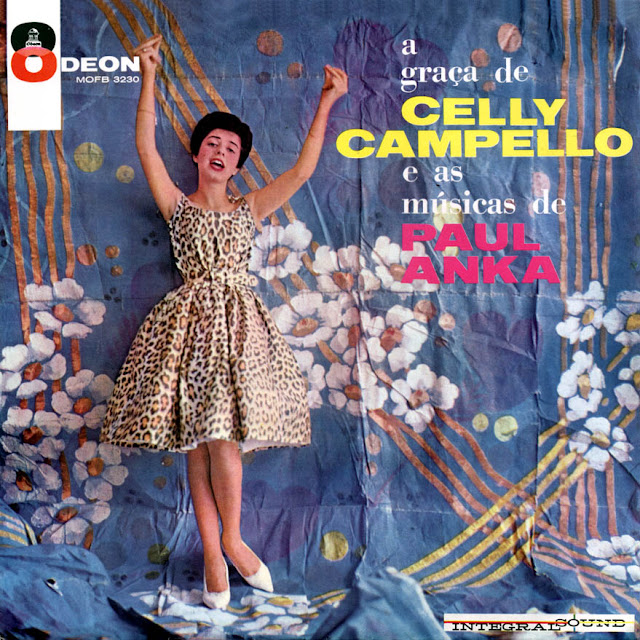Independent label California was started in February 1959, by Mario Vieira who was a lead singer with Vagalumes do Luar. Vieira had written 'Sabiá lá na gaiola' a big hit in the 1950s.
TC-1012 - April 1959
A- Sayonara (Irving Berlin's fox-canção) translation: Kikuo Furuno - with Yoko Abe
B- Futani yorisoni (Cabecinha no ombro) Paulo Borges; trans.: Kikuo Furuno; with Guido Miyoshi; recorded: 10 April 1959.
TC-1033 - August 1959
A- Baião da Serra Grande (Fred Williams-Palmeira) trans.: Kikuo Furuno; with Guido Miyoshi
B- Cachito - bolero (Consuelo Velasquez) trans.: Kikuo Furuno; with Yoko Abe; recorded: 19 June 1959.
TC-1036 - September 1959 - José Otoni with The California's
A- Playboy (Neal Davis; v.: Carlos Américo)
B- Luciana (Antonio Carlos Jobim-Vinícius de Moraes)
TC-1065 - November 1959
A- India - guarânia (J.A.Flores-M.Ortiz Guerrero) trans.: Kikuo Furuno; Guido Miyoshi; recorded: 7 OCT 1959.
B- Be-bop-a-lula - rock (Gene Vincent-Davis) trans.: Seuti Yida; Yoko Abe; recorded: 14 August 1959.
TC-1085 - December 1959 - Vagalumes do Luar
A- Aki Kojima - marcha (Jaime Ribeiro-Carlos Ferlich)
B- Ignês (J.Ribeiro-C.Ferlich)
TC-1086 - December 1959 - Guido Miyoshi
A- Oh! Carol - calypso-rock (Greenfield-Sedaka) trans.: Fred Jorge-Kikuo Furuno; reciting: Getúlio Alves
B- Noite azul - rock-ballad (Carlos Armando-Rogério Cardoso) recorded: 7 DEC 1959.
TC-1136 - 23 May 1960 - Guido Miyoshi
A- Quero amar - calypso-rock (Deane-Weissman) trans.: Fred Jorge-Kikuo Furuno
B- Destino - tango (Mario Teresópolis) trans.: Kikuo Furuno
TC-1137 - August 1960 - Yoko Abe
A- My baby - calypso-rock (H.Balmes-C.Adams) trans.: M.A.Galvão-Ciro Cruz; recorded: 23 May 1960
B- Lampeão de gás - waltz (Zica Bergami) trans.: Kikuo Furuno; recorded: 7 AUG 1960.
TC-1184 - 10 October 1960 - Guido Miyoshi & Yoko Abe
A- Noite de paz (Stille Nacht) Franz Gruber; trans.: Kikuo Furuno
B- Sinos de Belém (Jingle bells) translation: Kikuo Furuno; arrangement: Evaldo Ruy
TC-1289 - 17 January 1962 - Guido Miyoshi
A- Lamento - samba (Djalma Ferreira-Luiz Antonio) trans.: Kikuo Furuno
B- Naguissa nite - toada (Shichiro Onodera)
TC-1065 - November 1959
A- India - guarânia (J.A.Flores-M.Ortiz Guerrero) trans.: Kikuo Furuno; Guido Miyoshi; recorded: 7 OCT 1959.
B- Be-bop-a-lula - rock (Gene Vincent-Davis) trans.: Seuti Yida; Yoko Abe; recorded: 14 August 1959.
TC-1085 - December 1959 - Vagalumes do Luar
A- Aki Kojima - marcha (Jaime Ribeiro-Carlos Ferlich)
B- Ignês (J.Ribeiro-C.Ferlich)
single released for Carnaval 1960 in which the author makes a pun at Akiko Kojima's name. Miss Japan, Akiko Kojima was elected Miss Universe 1959 to everyone's surprise.
TC-1086 - December 1959 - Guido Miyoshi
A- Oh! Carol - calypso-rock (Greenfield-Sedaka) trans.: Fred Jorge-Kikuo Furuno; reciting: Getúlio Alves
B- Noite azul - rock-ballad (Carlos Armando-Rogério Cardoso) recorded: 7 DEC 1959.
TC-1136 - 23 May 1960 - Guido Miyoshi
A- Quero amar - calypso-rock (Deane-Weissman) trans.: Fred Jorge-Kikuo Furuno
B- Destino - tango (Mario Teresópolis) trans.: Kikuo Furuno
TC-1137 - August 1960 - Yoko Abe
A- My baby - calypso-rock (H.Balmes-C.Adams) trans.: M.A.Galvão-Ciro Cruz; recorded: 23 May 1960
B- Lampeão de gás - waltz (Zica Bergami) trans.: Kikuo Furuno; recorded: 7 AUG 1960.
TC-1184 - 10 October 1960 - Guido Miyoshi & Yoko Abe
A- Noite de paz (Stille Nacht) Franz Gruber; trans.: Kikuo Furuno
B- Sinos de Belém (Jingle bells) translation: Kikuo Furuno; arrangement: Evaldo Ruy
TC-1289 - 17 January 1962 - Guido Miyoshi
A- Lamento - samba (Djalma Ferreira-Luiz Antonio) trans.: Kikuo Furuno
B- Naguissa nite - toada (Shichiro Onodera)














































